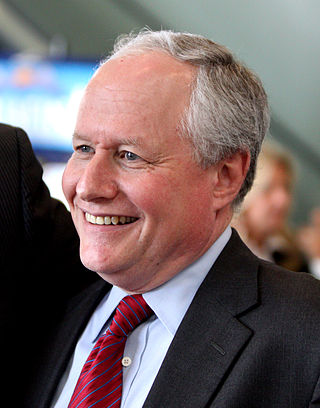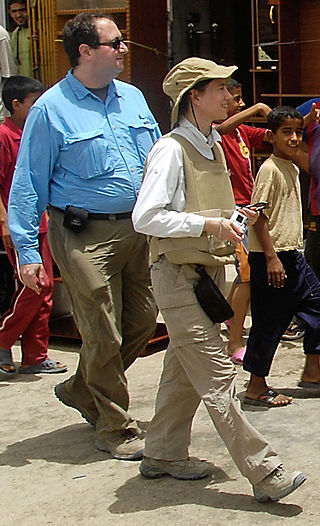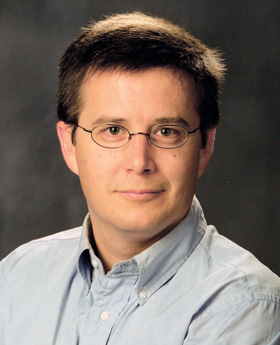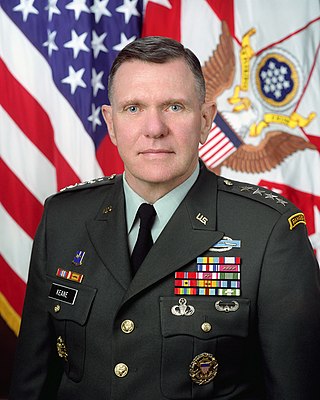Related Research Articles
Mutual assured destruction (MAD) is a doctrine of military strategy and national security policy which posits that a full-scale use of nuclear weapons by an attacker on a nuclear-armed defender with second-strike capabilities would cause the complete annihilation of both the attacker and the defender. It is based on the theory of rational deterrence, which holds that the threat of using strong weapons against the enemy prevents the enemy's use of those same weapons. The strategy is a form of Nash equilibrium in which, once armed, neither side has any incentive to initiate a conflict or to disarm.
The Project for the New American Century (PNAC) was a neoconservative think tank based in Washington, D.C., that focused on United States foreign policy. It was established as a non-profit educational organization in 1997, and founded by William Kristol and Robert Kagan. PNAC's stated goal was "to promote American global leadership." The organization stated that "American leadership is good both for America and for the world," and sought to build support for "a Reaganite policy of military strength and moral clarity."

William "Bill" Kristol is an American neoconservative writer. A frequent commentator on several networks including CNN, he was the founder and editor-at-large of the political magazine The Weekly Standard. Kristol is now editor-at-large of the center-right publication The Bulwark.
Neoconservatism is a political movement that began in the United States during the 1960s among liberal hawks who became disenchanted with the increasingly pacifist foreign policy of the Democratic Party and with the growing New Left and counterculture of the 1960s, particularly the Vietnam protests. Some also began to question their liberal beliefs regarding domestic policies such as the Great Society. Neoconservatives typically advocate the promotion of democracy and interventionism in international affairs, including peace through strength, and are known for espousing disdain for communism and political radicalism.
Grand strategy or high strategy is a state's strategy of how means can be used to advance and achieve national interests. Issues of grand strategy typically include the choice of primary versus secondary theaters in war, distribution of resources among the various services, the general types of armaments manufacturing to favor, and which international alliances best suit national goals. With considerable overlap with foreign policy, grand strategy focuses primarily on the military implications of policy. A country's political leadership typically directs grand strategy with input from the most senior military officials. Development of a nation's grand strategy may extend across many years or even multiple generations. While the grand strategy scholarship is dominated by the conception that only great powers can have grand strategies, some scholars argue that middle powers and even small states can have grand strategies.

Frederick W. Kagan is an American resident scholar at the American Enterprise Institute (AEI) and a former professor of military history at the U.S. Military Academy at West Point.

Ashton Baldwin Carter was an American government official and academic who served as the 25th United States Secretary of Defense from February 2015 to January 2017. He later served as director of the Belfer Center for Science & International Affairs at Harvard Kennedy School.

Peter Douglas Feaver is an American professor of political science and public policy at Duke University. He is known for his scholarship on civil-military relations. Feaver has served as the director of the Triangle Institute for Security Studies since 1999, and founded the Duke Program in American Grand Strategy. In 2007 he returned from service in the Bush administration, where he served as a special advisor for strategic planning and institutional reform on the National Security Council. Prior to working on the National Security Council of George W. Bush, Feaver served as director for defense policy and arms control at the National Security Council during the Clinton administration. He was also a lieutenant commander in the U.S. Naval Reserve.

The New Look was the name given to the national security policy of the United States during the administration of President Dwight D. Eisenhower. It reflected Eisenhower's concern for balancing the Cold War military commitments of the United States with the nation's financial resources. The policy emphasised reliance on strategic nuclear weapons as well as a reorganisation of conventional forces in an effort to deter potential threats, both conventional and nuclear, from the Eastern Bloc of nations headed by the Soviet Union.
Richard Kevin Betts is an American political scientist and international relations scholar who centers on U.S. foreign policy. He is currently the Arnold Saltzman Professor of War and Peace Studies in the Department of Political Science, the director of the International Security Policy Program in the School of International and Public Affairs at Columbia University, and former director of the Institute of War and Peace Studies.

John M. "Jack" Keane is a retired American four-star general, a former Vice Chief of Staff of the United States Army, and a recipient of the Presidential Medal of Freedom. He is a national security analyst, primarily on Fox News, and serves as chairman of the Institute for the Study of War and as chairman of AM General.

Andrew Francis Krepinevich Jr. is a defense policy analyst who is a distinguished senior fellow at the Center for Strategic and Budgetary Assessments.
Clark Murdock is a senior adviser at Center for Strategic and International Studies (CSIS), a Washington, D.C.-based foreign policy think tank. Murdock specializes in strategic planning, defense policy, and national security affairs. He also serves as the Director of the Project on Nuclear Issues, a collection of nuclear experts from government, academia, the national laboratories, the military, and the private sector.
Douglas A. Ross, Ph.D is a Canadian political scientist specializing in international relations, specifically Canadian foreign and defense policies, nuclear strategy, and arms control. He is currently Professor of Political Science at Simon Fraser University. Having obtained his BA in political science and economics, he went on to receive an MA and PhD in political science, all from the University of Toronto. His PhD thesis, completed under the supervision of the former Canadian diplomat John Wendell Holmes, was subsequently published as In the Interests of Peace: Canada and Vietnam, 1954–1973. It is widely considered the most comprehensive and authoritative account of Canadian foreign policy with regard to the Vietnam War.
The Foreign Policy Initiative (FPI) was an American think tank that operated from 2009 to 2017.

Kori N. Schake is the Director of Foreign and Defense Policy at the American Enterprise Institute. She has held several high positions in the U.S. Defense and State Departments and on the National Security Council. She was a foreign-policy adviser to the McCain-Palin 2008 presidential campaign. Schake is a contributing writer at The Atlantic.

William C. Martel was a scholar who specialized in studying the leadership and policymaking processes in organizations, strategic planning, cyberwarfare and militarisation of space, and technology innovation. He taught at the U.S. Air War College and U.S. Naval War College, and performed research for DARPA and the RAND Corporation. He later become Associate Professor of International Security Studies at the Fletcher School of Law and Diplomacy, a position he held until his death in 2015.
Dr. William H. Overholt is a senior research fellow at John F. Kennedy School of Government's Mossavar-Rahmani Center for Business and Government at Harvard University and principal of AsiaStrat LLC, a consulting firm.

Matthew Kroenig is an American political scientist, author, national security strategist, and former CIA officer. He is professor in the Department of Government and the Edmund A. Walsh School of Foreign Service at Georgetown University. Kroenig is best known for his research on international security and nuclear weapons.
Paul Young Hammond was an American foreign policy and security studies scholar. He was Distinguished Service Professor at the University of Pittsburgh Graduate School of Public and International Affairs from 1983 on; before that he was the Edward R. Weidlein Professor of environmental and public policy studies beginning in 1976 at the University of Pittsburgh. Before that he was senior social scientist at the RAND Corporation from 1964–76, including being head of the social science department and also being program director for strategic studies and Asian studies during 1973-76. His career earlier saw stints at the Washington Center of Foreign Policy Research at Johns Hopkins University, Yale University, Columbia University, and the United States Naval Academy among other places. Hammond also often worked as a consultant to various departments of the United States Government.
References
- 1 2 "Rosen is First Kaneb Professor". Archived from the original on 2007-08-16. Retrieved 2007-06-27.
- ↑ Kristol, William (September 20, 2001). "Bush letter". Project for the New American Century. Archived from the original on October 18, 2013. Retrieved January 10, 2023.
- ↑ Rebuilding America's Defenses: Strategies, Forces and Resources for a New Century Archived September 23, 2002, at the Wayback Machine , Project for the New American Century, September 2000, accessed May 14, 2007.
- ↑ "Rudy Giuliani Announces Foreign Policy Team Members". JoinRudy2008.com. 2007-07-09. Archived from the original on 2007-12-03. Retrieved 2007-11-15.
- ↑ "Giuliani names 3 more Jews as advisers". Jewish Telegraphic Agency jta.org. 2007-10-12. Archived from the original on 2007-11-14. Retrieved 2007-11-15.
- ↑ "Stephen Rosen on Conversations with Bill Kristol".
- ↑ "Stephen Rosen Transcript - Conversations with Bill Kristol".
- ↑ "Stephen P. Rosen | AMERICA ABROAD MEDIA". Archived from the original on 2013-01-25. Retrieved 2014-06-16.